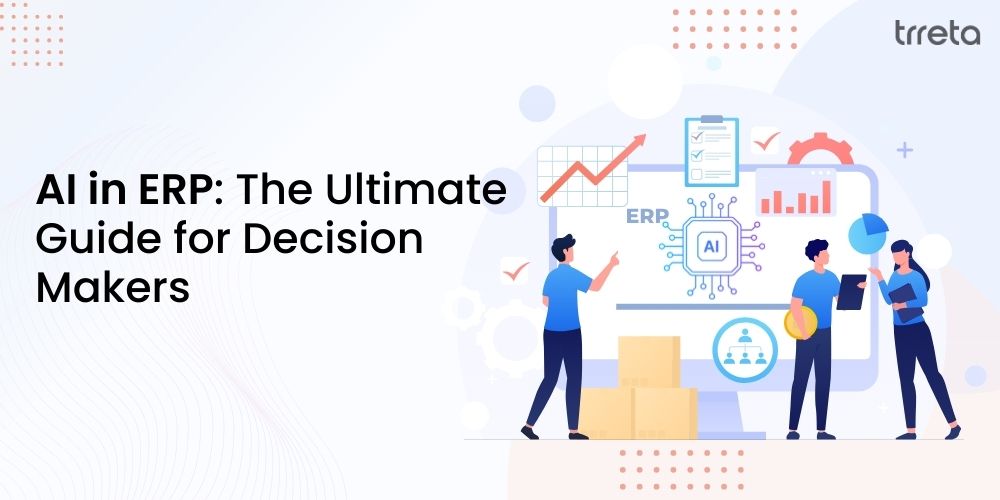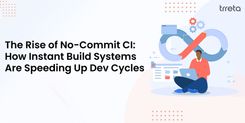If you look into your existing or past ERPs, you would find that they were designed to help companies manage operations, not make intelligent decisions.
They're good at processing transactions, tracking inventory, and recording sales, but that’s it! They can’t be more helpful than that!
All you get is a few historical data points and reports. But what you don’t get is insights and strategies. And to stay relevant in today’s market, that’s not enough.
That’s where AI in ERP changes the game.
When you integrate artificial intelligence in ERP, your system stops being a passive database and becomes an active advisor. AI in ERP software can predict needs, flag risks, streamline decisions, and in many cases, take action without waiting for a human.
Isn’t that amazing?
In this guide, we will help business leaders like you to explore what AI ERP really means, how is AI used in ERP, what changes it brings to your business, and how you can start making use of artificial intelligence in ERP.
So, let’s get started without any further ado.
Why Is AI in ERP Important?
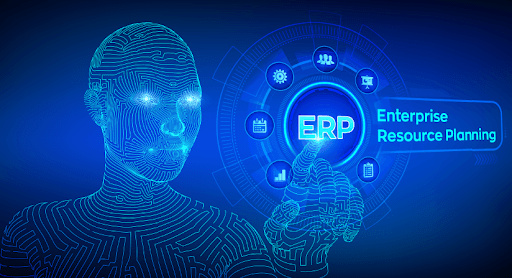
The simple reason why AI in ERP systems is important is that data without interpretation is just noise.
Traditional ERPs are full of noise of numbers, logs, and transactions. You need a human or an employee to make sense out of it.
Well, now with AI ERP, you can make more sense of your data. You can find red flags early, as ERP AI can notice patterns across regions.
Moreover, you can reorder inventory automatically based on weather patterns and supplier delays. And the best part is - finance teams get early warnings about cash flow issues two quarters ahead.
So, in short, AI in ERP software is not only about automation but getting a sneak peek into the future.
Now, let’s have a look at how AI in ERP systems makes them different from traditional systems.
Traditional ERP vs AI-Enabled ERP - The Difference!
Here’s a quick glimpse of the difference between traditional and AI-enabled ERP systems
| Traditional ERP | AI-Enabled ERP |
| Data is static and historical | Data updates in real-time |
| Processes are rule-based | Processes adapt with AI insights |
| User input is required for most tasks | Automation reduces manual work |
| Reactive | Predictive and proactive |
Let’s understand this difference with AI in ERP examples.
So, imagine a global manufacturer managing supply chains across five continents. A traditional ERP can log supplier deliveries and generate reports, but that’s it.
An AI ERP system, on the other hand, notices delays from a key supplier, correlates them with weather data, forecasts stockouts in two months, and proactively suggests alternate suppliers based on past performance and current pricing.
That’s the real power of ERP artificial intelligence in action.
This was an example of predictive AI in ERP. But there are many other types of AI in ERP, as mentioned below.
4 Popular Types of AI in ERP Systems
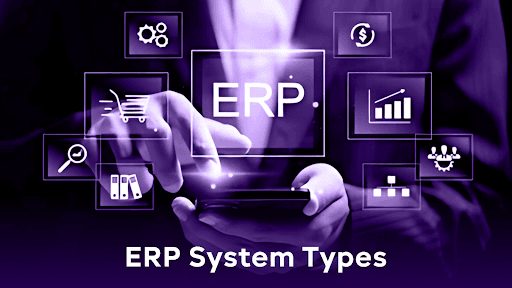
ERP artificial intelligence is not just one feature or a tool, but a layered concept with multiple types, where each type plays a different role.
Here are some popular types of AI in ERP software -
1. Predictive AI:
It spots patterns and forecasts what’s coming. Think demand forecasting, revenue projections, or downtime predictions. If your sales dip every February, it’ll flag it, and maybe even tell you why.
2. Prescriptive AI:
This takes it further. It doesn’t just predict what’ll happen, it suggests what to do about it. For example, it might recommend moving stock from one warehouse to another to avoid delivery delays next week.
3. Conversational AI:
Think smart assistants built into your ERP. Need to check a vendor payment status? Just ask. Employees interact with the system via chat, voice, or mobile without clicking through 10 menus.
4. Generative AI:
Finally, generative AI is the newest frontier. It can create reports, draft emails to vendors, summarize meetings based on ERP logs, or even generate a product description using your sales history.
Each of these adds a different dimension to AI in ERP software, transforming the way your employees and users interact with enterprise systems.
Top 4 Benefits of Integrating AI in ERP Systems for Decision Makers
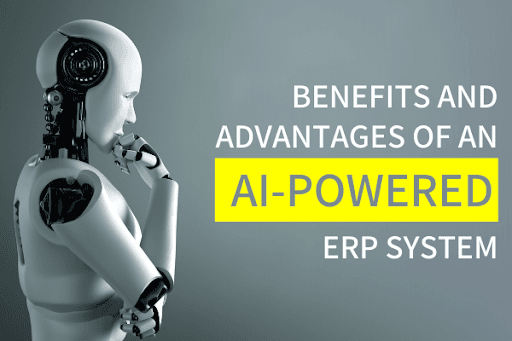
Based on our experience working with enterprises and growing businesses, we can say that AI in ERP is not just a tech upgrade but a business advantage.
Here’s what leaders really get from artificial intelligence in ERP:
1. Faster, smarter decisions
Instead of waiting for analysts to pull reports, with ERP AI, you get dashboards that evolve in real-time. You know what’s happening across sales, ops, and finance, without asking multiple teams.
2. Reduced costs and errors
AI handles the repetitive stuff: invoice checks, data entry, and forecasting. That means fewer mistakes, lower headcounts, and more time for humans to focus on strategy.
3. Improved forecasting
Whether it’s cash flow, customer churn, or parts shortages, predictive AI sees the signals and acts early. You stay ahead of risk instead of reacting to it.
4. Better employee experience
From HR bots to guided workflows, easy ERP AI makes systems easier to use, even for non-technical teams. That means less training, fewer errors, and higher adoption.
The ROI? Companies using ERP AI see 10 to 25% gains in productivity within the first year. And that’s just the beginning.
Top 7 AI Use Cases in ERP for Higher Business Productivity
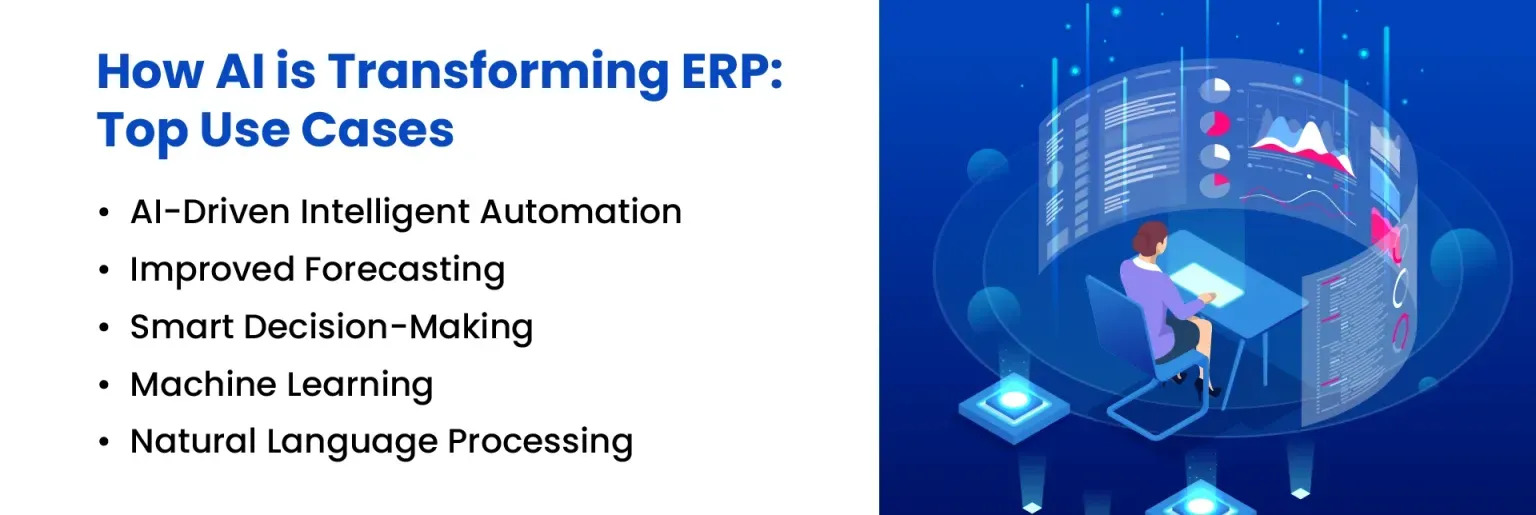
You’re probably wondering: how is AI used in ERP on a daily basis? Here’s what it looks like inside real companies:
1. Smart Invoice Matching
AI compares invoice data with purchase orders and delivery records automatically. It flags mismatches and cuts processing time by 80%, freeing up your finance team.
2. Predictive Maintenance
Instead of waiting for machines to break, AI monitors sensor data to predict failures. That means fewer outages and lower repair bills.
3. Fraud Detection in Procurement
AI tracks spending patterns and vendor behavior. If something’s off, like sudden price hikes or duplicate invoices, it raises a red flag.
4. Dynamic Pricing Suggestions
AI evaluates competitors, demand shifts, and stock levels to recommend price adjustments in real-time. Retailers and manufacturers can stay profitable without manual rework.
5. AI Chatbots for HR and Vendors
Whether it’s employees checking leave balances or suppliers updating contact info, AI-powered assistants reduce helpdesk queries by 40 to 60%.
6. Inventory Optimization
Using demand sensing, AI adjusts stock levels based on seasonality, trends, and sales forecasts. No more overstocking or emergency reorders.
7. Generative Reporting
Your ERP can auto-generate performance reports for managers, complete with insights and suggested next steps, so that you don’t have to chase BI teams.
So take inspiration from these AI in ERP examples and build something meaningful by switching your ERP for the better.
Make the Most of AI in ERP with Trreta Technolabs
Though AI in ERP is highly beneficial to businesses, implementing easy ERP AI isn’t a plug-and-play solution. It needs a partner who understands your ERP ecosystem, your business workflows, and how to bring AI into the mix without disruption.
That’s what we do at Trreta Techlabs.
We help companies like yours upgrade their ERP platforms with smart, scalable solutions, whether it’s integrating generative AI, building predictive dashboards, or automating workflows.
And because we also offer AI/ML development services beyond ERP, we help businesses align operations, data, and growth under one roof.
Looking to modernize your ERP with AI? Contact us to start your journey.
FAQs on AI in ERP
Q1. Why does AI matter in ERP today?
AI in ERP systems matters today because it helps businesses shift from reactive operations to predictive, insight-led strategies. AI is the difference between knowing what happened and knowing what to do next.
Q2. What are quick-win use cases for AI in ERP?
Some of the quick-win cases of AI in ERP include invoice automation, predictive inventory, and employee chatbots. These deliver fast ROI and don’t require full-system overhauls.
Q3. How much investment should a business expect for an AI-enabled ERP?
Well, the budget for AI-enabled ERP depends on the use case, system size, and complexity. Many businesses start with targeted AI pilots, typically $25K–$100K, and scale from there.
Q4. What should leaders consider when choosing an AI-ERP partner?
While choosing an AI-ERP partner, look for a team that understands both ERP systems and AI/ML models. Integration experience, data governance, and business process knowledge make the real difference.
